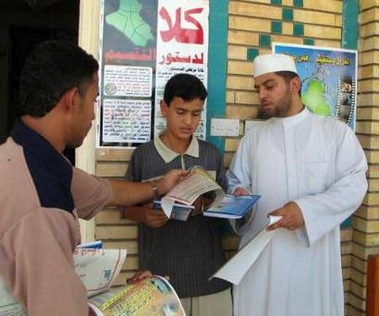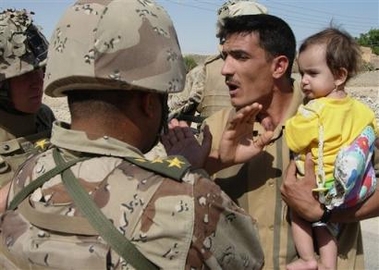|
Iraq unveils security measures for vote
(AP)
Updated: 2005-10-09 08:42
Iraq announced a curfew, weapons ban, border closings and other security
measures Saturday to clamp down ahead of next weekend's key constitutional
referendum and prevent insurgent attacks. Sunni Arabs geared up their campaign
to defeat the measure at the polls.
Two U.S. soldiers were killed in fighting in western Iraq, bringing to eight
the number of American casualties in a series of offensives the military has
launched to put down militants before the Oct. 15 vote.

An election worker distributes information on
Iraq's draft constitution in the town of Kut, 160 km (100 miles) south of
Baghdad October 8, 2005.[Reuters] | In Baghdad, a
suicide attacker detonated a car full of explosives at two police vehicles
forming a checkpoint, killing at least five policemen and wounding 20 people,
including six civilians.
It was the sort of attack Iraqi security forces are hoping to avert with a
ban on using vehicles on voting day — a step taken during parliamentary
elections in January. Sunni-led insurgents have vowed to wreck the referendum
with a wave of attacks.
"We will protect those who say yes and those who say no," Interior Minister
Bayan Jabr said in Baghdad. "We have countermeasures against all terrorist
actions, and you will see tens of thousands of Iraqi security forces deployed in
Baghdad and the provinces."

An Iraqi father trying to take his ill child
to a hospital in a nearby city talks to U.S. Marines and an Iraqi Army
commander Saturday Oct. 8, 2005, in Haditha, Iraq. The man could not reach
the hospital after major roads were blocked during the latest offensive by
U.S. and Iraqi forces searching for insurgents in western Iraq, but the
Marines instructed the man to bring the child to their base for treatment.
[AP] | On Thursday — two days ahead of the vote —
a nationwide nighttime curfew will begin and nobody will be able to carry
weapons in public, even if they are licensed, Jabr said. On Friday evening,
police will bar travel between provinces. International borders, airports and
ports also will be closed, but Jabr did not say when that step would begin.
He acknowledged problems with security in Iraq's western province of Anbar,
the heartland of the insurgency. In the provincial capital of Ramadi, only 1,000
of the city's 6,500-member police force were willing to come to work, Jabr said.
He said help from powerful local tribes was needed to protect polling stations
and the Iraqi military would have to be responsible for security.
The referendum has divided Iraqis, with leaders of the Shiite Muslim majority
and Kurds supporting the constitution and Sunni Arabs opposing it, saying it
will fragment Iraq. Sunnis can defeat the charter if they garner a two-thirds
"no" vote in any three of Iraq's 18 provinces.
A delegation from the Arab League arrived Saturday in Iraq to lay the
groundwork for an Iraqi "reconciliation conference" it hopes to hold after the
vote. It was the first time the pan-Arab organization has tried to take a direct
role in Iraq since the 2003 U.S.-led invasion.
"The situation is so tense there is a threat looming in the air about civil
war that could erupt at any moment, although some people would say that it is
already there," Arab League Secretary-General Amr Moussa warned in an interview
with British Broadcasting Corp. radio on Saturday.
|